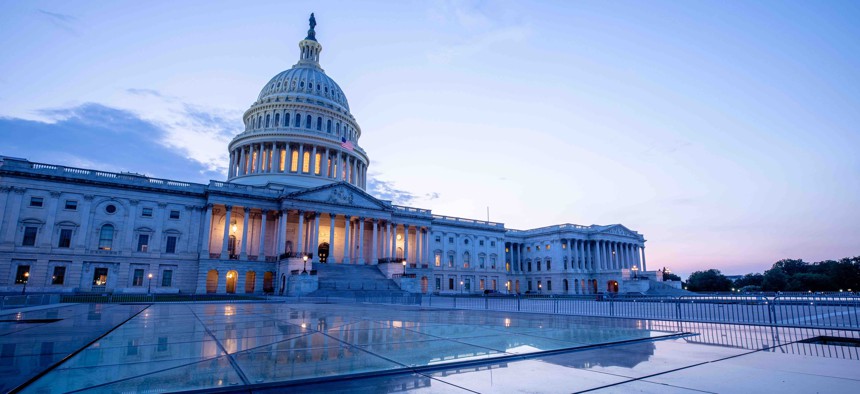With Covid Aid Approved, Counties Will Look to Infrastructure

The U.S. Capitol building. iStock.com/Stephen Emlund
A major public works package, which proved elusive during the Trump years, is the next priority county governments will press for on Capitol Hill.
Securing aid for local governments as part of coronavirus relief legislation was the top concern for many county governments heading into 2021. With around $66 billion for counties included in the massive aid package President Biden signed Thursday, county leaders will now begin shifting their federal advocacy efforts to focus more on infrastructure and broadband.
While former president Donald Trump repeatedly voiced interest in an expansive infrastructure program, his administration was never able to build support for a plan among Republicans on Capitol Hill. With Democrats now in control of Congress and the White House, groups like the National Association of Counties see a renewed chance for action on the issue.
Mark Ritacco, NACo’s director of government affairs, noted that there’s a sense of urgency for those backing increased federal infrastructure investment. It’s possible Democrats could lose full control of Congress in the 2022 election cycle, in which case the window for major legislation would likely slam shut.
But even with Democrats in charge of the House and holding a one-vote majority in the Senate, passing a major infrastructure bill promises to be tough. Congress is now on track to spend up to $6 trillion on pandemic relief packages it has approved since last year. That’s more than the entire amount of spending of $4.4 trillion in the fiscal 2019 federal budget.
With all of the covid relief outlays, deficits are now on track to be around $3 trillion two years in a row, the Committee for a Responsible Federal Budget recently pointed out. To avoid adding to the nation’s annual budget shortalls and growing debt, Congress and the White House would need a plan to raise revenue to pay for new infrastructure spending.
A gas tax increase is one option, but is a non-starter for many Republicans and is also flawed as the nation continues to shift toward more fuel-efficient and electric vehicles. There’s some bipartisan support for transitioning to a mileage-based charge, but it would take time to set up a system to collect these fees and some people have privacy concerns about the idea.
And while higher taxes on motorists could help fund roads and transit, there are also massive infrastructure needs in other areas, like water and sewer systems, the power grid and public works to protect communities from sea level rise and flooding from storms and rivers.
It’s possible Congress could expand the financing tools available to states and localities under federal tax laws. For instance, one possibility would be to restore a tax exemption for a municipal bond refinancing and restructuring option that was eliminated during the 2017 federal tax overhaul.
Steps like this might help with funding projects. But smaller and mid-sized localities, in particular, often argue that they need more federal dollars, not just new ways to borrow.
Counties can end up being an overshadowed level of government, with states and cities frequently getting more attention. But they are responsible for large amounts of the nation’s infrastructure, including about 45% of roads and 38% of bridges. So the stakes for them in forthcoming infrastructure debates in Washington are high.
“Infrastructure,” said Ritacco, “is, of course, a huge county priority.”
A related issue is broadband. Many rural communities struggle with poor or nonexistent high-speed internet service. Ritacco said that, in recent months, the No. 1 issue he’s heard about from county officials, apart from the pandemic, is the need for improved broadband.
During the past year, amid the Covid-19 outbreak, with millions of Americans working from home, kids attending school online, and telehealth appointments becoming more common, shortcomings with high-speed internet access have only become more glaring.
"The pandemic has really laid bare the inequities in our broadband infrastructure,” Ritacco said, noting that while the problems with connectivity tend to be more acute in rural areas, they can exist in urban communities as well. "If your community was not set up with reliable internet before the pandemic,” he said, “your outcomes for the pandemic were a lot worse.”
While there’s been progress on improving high-speed internet access in recent years, Ritacco said the technical complexity of expanding the network, the complicated policies and regulations involved, and the cost explain why lawmakers and internet providers have so far been unable to fill in service gaps more completely.
“There’s been incremental investments,” Ritacco said. “But we’re looking for the type of generational investment in broadband that will help us catch up.”
During the Trump years, NACo, which has more members from areas that are rural and tend to lean Republican than groups like the National League of Cities or U.S. Conference of Mayors, was known for having one of the warmer relationships with the White House among the groups that advocate on behalf of local governments.
Ritacco said that the group is so far getting along fine with the Biden administration as well. “The relationship with the Trump administration and NACo was excellent,” he added. "The relationship with the Biden administration and NACo is also excellent.”
Bill Lucia is a senior editor for Route Fifty and is based in Olympia, Washington.
NEXT STORY: Retrofitting Parking Garages Could Help With Affordable Housing Shortage






